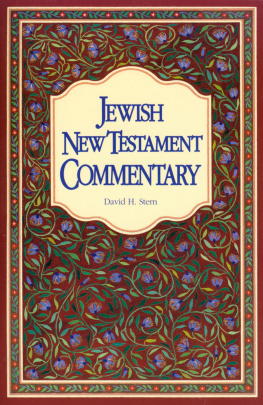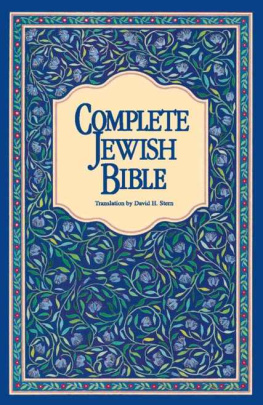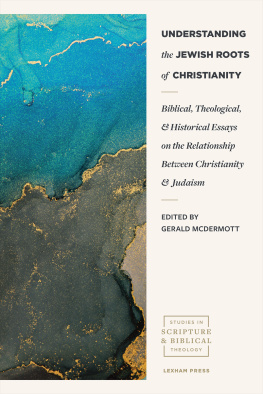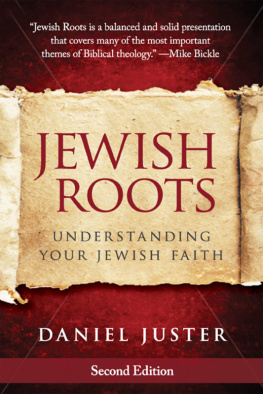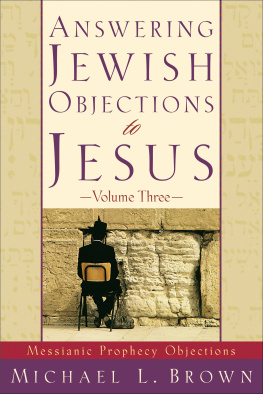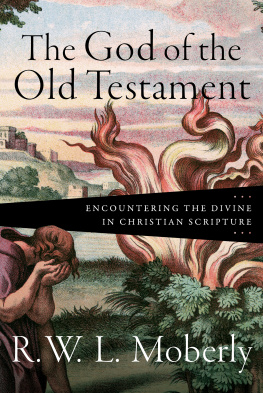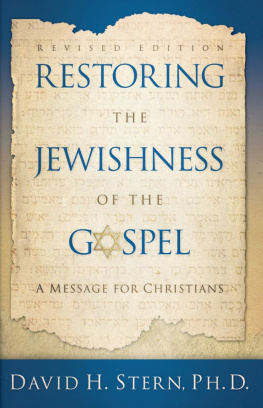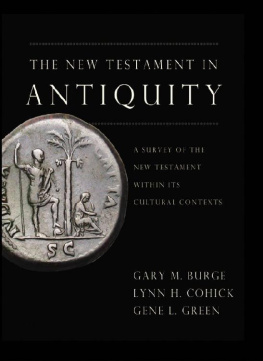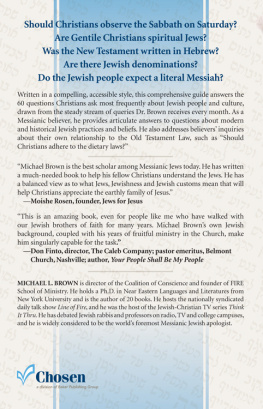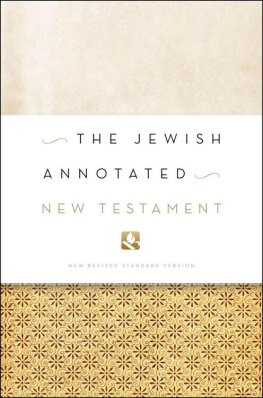JEWISH
NEW TESTAMENT
COMMENTARY
Other books by David H. Stern also available from Jewish New Testament Publications, Inc.
* Jewish New Testament
(available in softcover, hardcover, leatherette, and on audio cassette)
Messianic Judaism: A Modern Movement With An Ancient Past
(formerly Messianic Jewish Manifesto)
Restoring the Jewishness of the Gospel
Complete Jewish Bible
* German edition available through Haenssler-Verlag, Friedrich Haenssler KG, Postfach 1220, W7303 Neuhasen, Germany
Portuguese edition available through Comunidade Emanuel, Caixa Postal 941, 2001 Rio De Janeiro, Brazil
Japanese edition available through Malkoushu Publications, 1821-31 Ogawa-higashimachi, Kodaira-city, Tokyo 187, Japan
Spanish edition published by Jewish New Testament Publications, Inc., P. O. Box 615, Clarksville, MD 21029, USA. Distributed by Messianic Jewish Resources International.
JEWISH
NEW TESTAMENT
COMMENTARY
A companion volume to the
Jewish New Testament
by
David H. Stern

JEWISH NEW TESTAMENT PUBLICATIONS
Copyright 1992 by David H. Stern
All rights reserved. No part of this publication may be reproduced, stored in a retrieval system, or transmitted in any form or by any means without prior written permission of the publisher, except for brief reviews in magazines, or as quotations in another work when full attribution is given.
The Jewish New Testament, copyright 1989 by David H. Stern, is published by Jewish New Testament Publications, Inc.
Cover illustration by Mickie Klugman-Caspi
Interior design by Now You See it! graphics
Printed in the United States of America
ISBN 13 978-965-359-008-3
ISBN 13 978-965-359-011-3
eISBN 978-1-936716-58-6
Library of Congress Catalog Control Number: 92097129
Published by
JEWISH NEW TESTAMENT PUBLICATIONS, INC.
6120 Daylong Lane
Clarksville, Maryland 21029
(410) 531-9660
Distributed by
Messianic Jewish Resources International
Order Line: (800) 410-7367
E-mail:
Website: www.messianicjewish.net
For the glory of God,
the salvation of Israel
and the edification of the Messianic Community
INTRODUCTION
I WHAT IS THE JEWISH NEW TESTAMENT COMMENTARY?
The Jewish New Testament Commentary (JNTC) deals with Jewish issues that confront readers of the New Testament questions Jews have about Yeshua (Jesus), the New Testament and Christianity; questions Christians have about Judaism and the Jewish roots of their faith; and questions Messianic Jews have about being both Jewish and Messianic. It is a companion volume to the Jewish New Testament (JNT), my translation of the New Testament from the original Greek into English in a way that brings out its essential Jewishness.
A Consciousness-Raising Commentary. Nearly everyone approaches the New Testament with preconceived opinions about its Jewish issues. Sometimes this is the consequence of not having examined them, sometimes it is because of prejudice or childhood training. In any case, my object in the Jewish New Testament Commentary is to make people more aware of the New Testaments Jewish issues and thus able to reach new conclusions about them.
For this reason I call the JNTC a consciousness-raising commentary. It presents information that offers new options. A reader should come away understanding that the New Testament is a Jewish book written by Jews, largely about Jews, and meant for both Jews and Gentiles. Jews should know that the New Testament presents Yeshua from Natzeret (Nazareth) as the Son of David, Israels long-awaited Messiah, essential for Jewish individual and corporate salvation. Christians should be certain that they are forever one with the Jewish people, and that the New Testament gives no ground for antisemitism in any form.
II THE COMBINED JNTJNTC PROJECT
This consciousness-raising task is carried out partly by the Jewish New Testament and partly by this book. Actually, my original idea, in 1977, was only to write a commentary on the New Testament dealing with Jewish issues. But after drafting notes to a few chapters of the book of Acts I realized that much of what I was writing consisted of objections to the English version I was using: The translation says X, but the Greek original really means Y. Rather than waste the readers time castigating third parties (translators), I decided to try translating the Greek text myself and discovered that I liked the result. Thus the Jewish New Testament was born as an afterthought. From then on I keyed my comments to the JNT and dealt with what I considered mistaken renderings in other versions as being distinct from what the New Testament itself says (that is, from what I understand it to be saying).
I intended to publish both translation and commentary in a single volume, not only because they complement each other, but because I believed that some of the more controversial renderings in the JNT needed my JNTC notes to defend them. Unfortunately the rhythm of my life made it hard for me to finish this project quickly. When the translation was essentially done but I was still working on the commentary, a friend said, Publish the Jewish New Testament by itself. Both Jews and Christians need to see what a Jewish book the New Testament is. Dont worry about defending it the Word of God can stand by itself. Later your commentary will serve its purpose. He convinced me, so I published the first edition of the JNT in 1989; there have been three subsequent printings.
While the JNT was greeted with joy by most Messianic Jews, many Christians, some non-Messianic Jews and a number of reviewers, there were, of course, critics. Whenever I read a negative comment I considered unjustified, I felt frustrated that the commentary was not there to provide a defense. Now it is, and I hope it will stimulate intelligent discussion of the Jewish issues surrounding the New Testament.
The Jewish New Testament. Since the JNTC is based on the JNT, a few words about it seem in order. The JNT expresses the New Testaments essential Jewishness in three ways, which I call cosmetic (or superficial), cultural-religious, and theological.
Cosmetic elements such as using execution-stake instead of cross, Yaakov instead of James, and, of course, Yeshua the Messiah instead of Jesus Christ are the most obvious; and their frequency has a collective effect.
Cultural-religious elements embed the Gospel more securely in its Jewish setting; two examples are my use of the word tzitzit instead of fringe at Mattityahu (Matthew) 9:20 to describe what the woman with a hemorrhage touched, and Chanukkah instead of the feast of dedication at Yochanan (John) 10:22.
Theological elements include translating Messianic Jews (Hebrews) 8:6 so as to show that the New Covenant has been not merely established but given as Torah, and rendering Romans 10:4 the goal at which the Torah aims is the Messiah, not Christ is the end of the law.
For a fuller discussion of the character of the JNT, see Section V below.
Messianic Jewish Commentaries on the New Testament. The JNTC is, so far as I know, only the second commentary on the entire New Testament ever written by a Messianic Jew. The first was by Jehiel Zvi Lichtenstein (1827-1912), whose Commentary to the New Testament,
Next page
